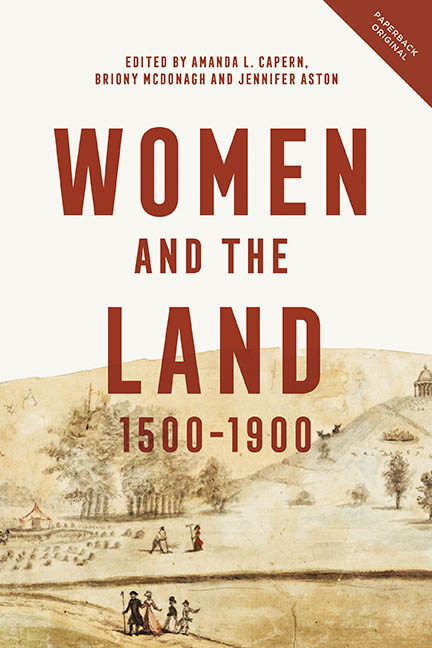Book contents
- Frontmatter
- Contents
- List of Illustrations
- List of Contributors
- Introduction: Women, Property and Land
- 1 Women, Work and Land: The Spatial Dynamics of Gender Relations in Early Modern England 1550–1750
- 2 Spinsters with Land in Early Modern England: Inheritance, Possession and Use
- 3 Becoming Anne Clifford
- 4 The Heiress Reconsidered: Contexts for Understanding the Abduction of Arabella Alleyn
- 5 From Magnificent Houses to Disagreeable Country: Lady Sophia Newdigate's Tour of Southern England and Derbyshire, 1748
- 6 On Being ‘fully and completely mistress of the whole business’: Gender, Land and Estate Accounting in Georgian England
- 7 Negotiating Men: Elizabeth Montagu, ‘Capability’ Brown and the Construction of Pastoral
- 8 Women's Involvement in Property in the North Riding of Yorkshire in the Eighteenth and Nineteenth Centuries
- 9 Invisible Women: Small-scale Landed Proprietors in Nineteenth-century England
- 10 More than Just a Caretaker: Women's Role in the Intergenerational Transfer of Real and Personal Property in Nineteenth-century Urban England, 1840–1900
- Afterword
- Select Bibliography
- Index
- PEOPLE, MARKETS, GOODS: ECONOMIES AND SOCIETIES IN HISTORY
6 - On Being ‘fully and completely mistress of the whole business’: Gender, Land and Estate Accounting in Georgian England
Published online by Cambridge University Press: 21 March 2020
- Frontmatter
- Contents
- List of Illustrations
- List of Contributors
- Introduction: Women, Property and Land
- 1 Women, Work and Land: The Spatial Dynamics of Gender Relations in Early Modern England 1550–1750
- 2 Spinsters with Land in Early Modern England: Inheritance, Possession and Use
- 3 Becoming Anne Clifford
- 4 The Heiress Reconsidered: Contexts for Understanding the Abduction of Arabella Alleyn
- 5 From Magnificent Houses to Disagreeable Country: Lady Sophia Newdigate's Tour of Southern England and Derbyshire, 1748
- 6 On Being ‘fully and completely mistress of the whole business’: Gender, Land and Estate Accounting in Georgian England
- 7 Negotiating Men: Elizabeth Montagu, ‘Capability’ Brown and the Construction of Pastoral
- 8 Women's Involvement in Property in the North Riding of Yorkshire in the Eighteenth and Nineteenth Centuries
- 9 Invisible Women: Small-scale Landed Proprietors in Nineteenth-century England
- 10 More than Just a Caretaker: Women's Role in the Intergenerational Transfer of Real and Personal Property in Nineteenth-century Urban England, 1840–1900
- Afterword
- Select Bibliography
- Index
- PEOPLE, MARKETS, GOODS: ECONOMIES AND SOCIETIES IN HISTORY
Summary
Permit one of your sex to give you, as far as her small knowledge will reach some hints to the right understanding of Accounts: an Art so useful for all sorts, sexes and degrees of persons especially for such as ever think to have to do in the world in any sort of Trade or Commerce …
Advice to the Maidens of London … By One of That Sex (1678)Keep your accounts clear // Throughout the year // Let no mistake be made // Either in paying, or pay’d
Account book of Elizabeth Hood (c. 1787–1808)Penned roughly a century apart at either end of the long eighteenth century, the lines above signal something of the importance of accounting for women. As the anonymous author of Advice to the Maidens of London suggested, a working knowledge of accounting methods was a valuable skill for middleclass women to have. The full title made clear the author's thinking:
Advice to the Women and Maidens of London: Shewing, that instead of their usual Pastime; and education in Needle-work, Lace, and Point-making, it were far more Necessary and Profitable to apply themselves to the right Understanding and Practice of the method of keeping books of account: whereby, either single, or married, they may know their Estates, carry on their Trades, and avoid the Danger of a helpless and forlorn Condition, incident to Widows … By one of that Sex.
Likewise stressing the importance of good accounting, the rhyming couplets were penned by a woman from a rather different social background than the supposed consumers of the advice book. Elizabeth Hood was a Somerset gentlewoman who spent more than sixty years managing a modest landed estate in Butleigh Wootton and the surrounding area, keeping the estate accounts not just as a widow but also before and during her marriage. She wrote the couplets in the inside cover of an account book used to record sales from the home farm, purchases of land and investments in drainage works, activities which while at least partially profit-driven certainly did not constitute an engagement in the kind of trade or commerce envisaged by the advice book's author.
- Type
- Chapter
- Information
- Women and the Land, 1500–1900 , pp. 149 - 175Publisher: Boydell & BrewerPrint publication year: 2019

